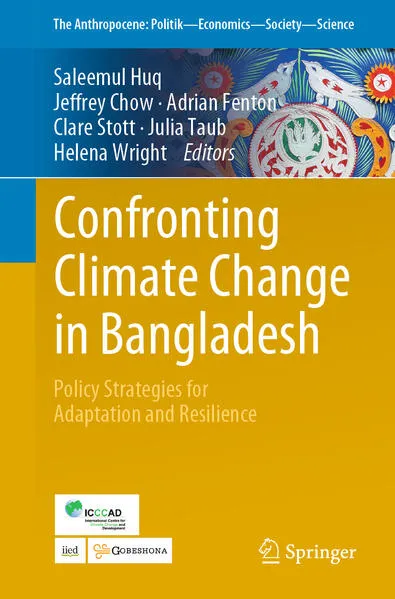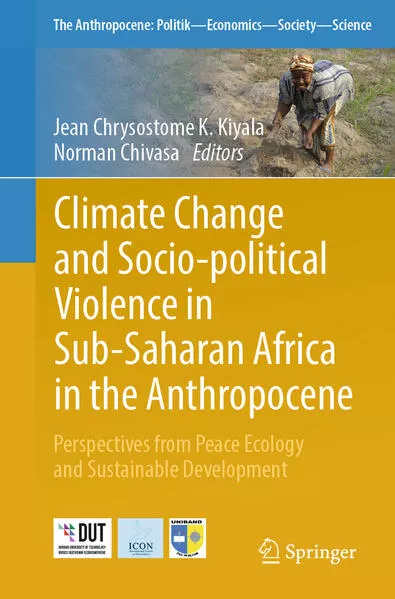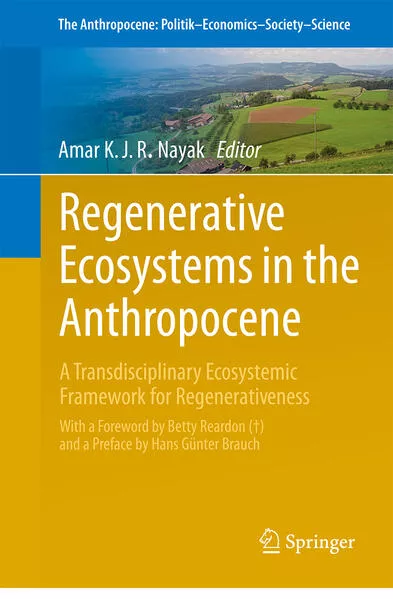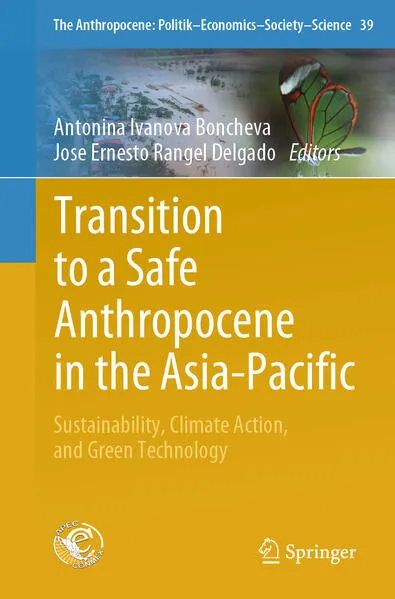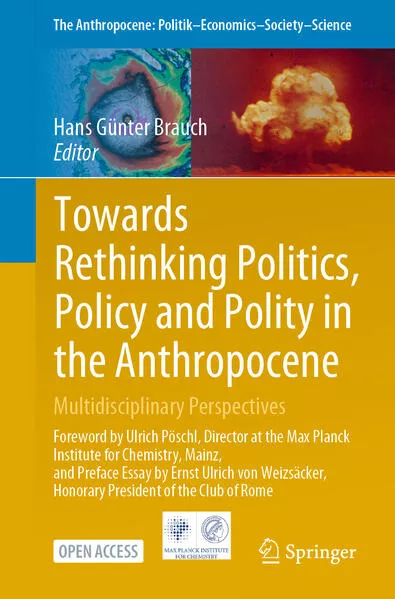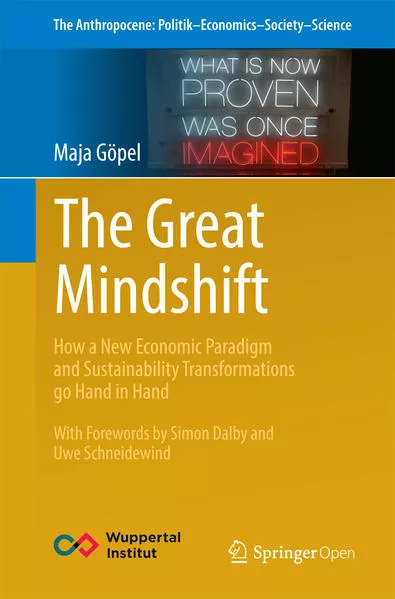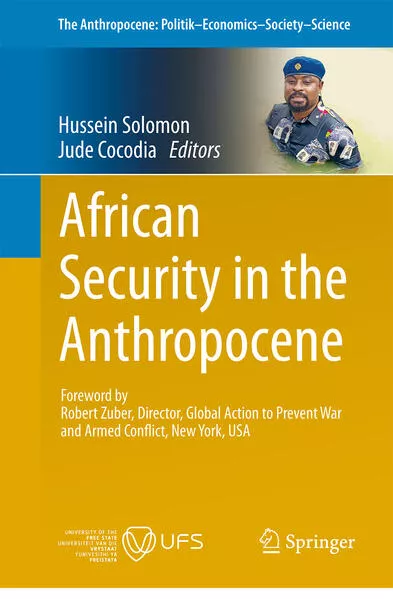The Anthropocene: Politik—Economics—Society—Science
African Security in the Anthropocene
Chronologie aller Bände (1 - 8)
Die Reihenfolge beginnt mit dem Buch "Confronting Climate Change in Bangladesh". Wer alle Bücher der Reihe nach lesen möchte, sollte mit diesem Band von Maja Göpel beginnen. Der zweite Teil der Reihe "Confronting Climate Change in Bangladesh" ist am 07.02.2019 erschienen. Mit insgesamt 8 Bänden wurde die Reihe über einen Zeitraum von ungefähr 8 Jahren fortgesetzt. Der neueste Band trägt den Titel "Towards Rethinking Politics, Policy and Polity in the Anthropocene".
- Anzahl der Bewertungen für die gesamte Reihe: 59
- Ø Bewertung der Reihe: 4.2
- Start der Reihe: 07.09.2016
- Neueste Folge: 25.02.2025
Diese Reihenfolge enthält 8 unterschiedliche Autoren.
- Autor: Huq, Saleemul
- Anzahl Bewertungen: 0
- Ø Bewertung:
- Medium: Buch
- Veröffentlicht: 19.02.2019
- Genre: Sonstiges
Confronting Climate Change in Bangladesh
Due to its vulnerability to a wide variety of climate change impacts, Bangladesh has become a laboratory for adaptation and resilience strategies in the developing world. The knowledge shared by experienced practitioners who have a deep understanding of the complex context of this country is an invaluable resource. The International Centre for Climate Change and Development has brought together a host of experts across multiple disciplines to provide a detailed look at Bangladesh's ongoing struggle to prepare for the inevitable threats that climate change poses. This volume presents public policy-oriented strategies across numerous sectors, including agriculture, freshwater management, forests, finance, human rights, health systems, flood control, infrastructure, solar energy, and more. Successes and shortcomings both provide useful lessons for other countries grappling with similar climate threats. This book offers the latest research findings for a wider audience.
- Showcasing the wealth of experience with adaptation and resilience in Bangladesh
- Drawing from expert practitioners across the numerous sectors affected by climate change
- Highlighting key lessons for other Least Developed Countries.
- Autor: Kiyala, Jean Chrysostome K.
- Anzahl Bewertungen: 0
- Ø Bewertung:
- Medium: Buch
- Veröffentlicht: 05.05.2024
- Genre: Politik
Climate Change and Socio-political Violence in Sub-Saharan Africa in the Anthropocene
This book explores the theoretical contribution of peace ecology to the understanding and practice of environmental and conventional peacebuilding. It integrates environmental questions and factors that drive socio-political violence and climate change-induced violence in Sub-Saharan Africa in the Anthropocene.
· It demonstrates how international peace and global security are no longer solely grounded in conventional peacebuilding that has evolved from liberal to democratic peace theories, but rather in the complex, critical and synergic relations between peace studies and environmental studies.
· It provides a pluridisciplinary body of knowledge that emphasises the need for food security, social climate, social good, social capital and sustainable development at the age of climate change and climate wars.· It underscores the potential of peace ecology to reduce the Earth systems' vulnerability, to mitigate anthropogenic global warming's consequences on humanity, the ecosystem and biodiversity.
· It yields various models of peacebuilding, conflict-sensitive and climate-sensitive adaptation strategies to enhance the African Region’s security and stability.
Finally, this volume argues that planetary boundaries framework remains the safer space within which human and sustainable development can be pursued and attained, and future generations to thrive. A comprehensive and international response to socio-political violence and climate-change induced violence should take into account the vulnerability of individual countries, regions and the global world in order to achieve the dreams of a better future; that makes this book a cutting-edge scholarly work.- Autor: Nayak, Amar KJR
- Anzahl Bewertungen: 0
- Ø Bewertung:
- Medium: Buch
- Veröffentlicht: 11.05.2024
- Genre: Politik
Regenerative Ecosystems in the Anthropocene
The book offers a transdisciplinary eco-systemic framework for analysis of ecosystems. It uses eight dimensions (economic-social-political-environmen-tal) and 40 factors to diagnose degenerating ecosystems and to synthesize regenerative ecosystems amid growing uncertainty, and inequality in the Anthropocene.
Chapter 1 broadly defines the `all interacting evolving systems science' (AIESS) approach in terms of its eco-systemic and transdisciplinary action research methodology. Chapter 2 provides a detailed explanation of the AIESS approach through the four concepts of interconnectedness, interdependence, interactions, and intent to diagnose degeneration and synthesize regenerative systems.
Part 1 of the book discusses the issues and approaches to Regenerativeness. Part 2, 3, 4, and 5 illustrate cases of regenerative systems in different ecosystems viz. natural, rural-indigenous, urban, and industrial ecosystems.
Not only the researchers and scholarsin systems science, systems dynamics, systems design, and sustainable transition strategies but also the policy makers, corporate leaders, and development experts will greatly benefit from this book.
1.Presents a ground breaking explanation of the science of change in the Anthropocene and in epochs prior to it through its all interacting evolving systems science framework.
2. Provides a unique transdisciplinary eco-systemic framework as a methodology to diagnose the complex degenerating ecosystems and to synthesize regenerative ecosystems in different geographies of the world.
3. Through various cases from different ecosystems viz., natural ecosystems, rural-indigenous ecosystems, urban ecosystems, and industrial ecosystems, the book presents the challenges as well as the steps and processes to synthesize regenerative ecosystems.
- Autor: Ivanova Boncheva, Antonina
- Anzahl Bewertungen: 0
- Ø Bewertung:
- Medium: Buch
- Veröffentlicht: 09.11.2024
- Genre: Politik
Transition to a Safe Anthropocene in the Asia-Pacific
The Anthropocene concept highlights that we are now living in a new epoch of earth history where both the rapid accumulation of greenhouse gases and excessive consumption of natural resources endanger human and planetary wellbeing. Climate change is one of the main drivers of the Anthropocene and is intricately linked to many great challenges we face: lack of fresh water, food security, biodiversity loss, and human rights of present and future generations. The radical influence of humanity on nature must change from destructive to reconstructive, by the path of sustainable development, circular economy, climate action, green technology, and environmental awareness.
This book explores the pathways of transition towards a safe and sustainable Anthropocene in the Asia-Pacific and reviews the progress and the challenges in climate action, the recovery from COVID-19, and the re-articulation of world order. The chapters address both regional and country levels, the majority analysing China and Mexico. The experiences presented can be replicated in other regions of the world.
The book offers useful insights for all interested in the Anthropocene, in climate action, sustainability, and the relationship between human beings and nature, thus motivating the decision-makers to implement a just and inclusive transition to a safe Anthropocene.
• A novel study that explores links between the Anthropocene, climate change, and sustainability, framing the transition towards a safe and sustainable Anthropocene in the Asia-Pacific.
• Strategies and policies on climate action, renewable energies, green technology, and environmental education include the participation of governments, NGOs, and civil society.
• Case studies based on experiences at the regional and country level provide valuable insights for both industrialised and developing countries.
- Autor: Brauch, Hans Günter
- Anzahl Bewertungen: 0
- Ø Bewertung:
- Medium: Buch
- Veröffentlicht: 25.02.2025
- Genre: Politik
Towards Rethinking Politics, Policy and Polity in the Anthropocene
Humankind faces two anthropogenic threats to its survival that are closely linked. The first is the end of the Holocene and the start of the Anthropocene, which was marked by the test of a nuclear bomb on 16 July 1945. In the prevailing peace and security narrative, nuclear weapons and the ‘other’ (country, bloc or alliance) pose a perceived threat to humankind’s survival. In the Anthropocene narrative, ‘we are the threat’ through our way of life and the burning of fossil fuels. The start of the Anthropocene coincides with a change in the international order with the setting up of the UN and the Bretton Woods Institutions. Three stages of this order are distinguished: the Cold War (bipolarity), the post-Cold War era (unipolarity), and the end of the rule-based global liberal order (multipolarity) on 24 February 2022. In this book ten multidisciplinary perspectives discuss complexity, Anthropocene geopolitics, peace and security discourses and the debate on the Anthropocene, planetary boundaries, complex crises and integrative geography in the Anthropocene, governance and politics, and the Patriacene and gender. Both existential threats for humankind are illustrated by cover photos of the first nuclear weapons test on 16 July 1945 and by Category 5 Hurricane Otis, an extreme weather event impacting on Acapulco in Mexico on 25 October 2023.
- The Anthropocene as a new epoch of Earth history coincides in 1945 with a change in the international order.
- In the security and peace narrative, the ‘other’ and nuclear weapons pose an existential threat; in the Anthropocene narrative.
- This dual existential change requires a rethinking of politics, policy and polity.
- In the social sciences, the Anthropocene is being discussed from multidisciplinary perspectives (geography, political science, and peace, security, and gender studies).
This is an open access publication.
- Band: 2
- Autor: Göpel, Maja
- Anzahl Bewertungen: 59
- Ø Bewertung: 4.2
- Medium: Buch
- Veröffentlicht: 07.09.2016
- Genre: Politik
The Great Mindshift
- Band: 33
- Autor: Hardt, Judith Nora
- Anzahl Bewertungen: 0
- Ø Bewertung:
- Medium: Buch
- Veröffentlicht: 11.06.2023
- Genre: Politik
Climate Security in the Anthropocene
The speed and scale of climate change presents unique and potentially monumental security implications for individuals, future generations, international institutions and states. Long-dominant security paradigms and policies may no longer be appropriate for dealing with these new security risks of the Anthropocene. In response to this phenomenon, this book investigates how states have reacted to these new challenges and how their different understandings of the climate-security nexus might shape global actions on. It focuses on the perceptions, framings, and policies of climate security by members of the United Nations Security Council (UNSC), the world's highest ranking multilateral security forum.
Empirically, the book presents detailed, bottom-up case studies from local authors of every UNSC member state in 2020 and beyond. It combines this with an innovative theoretical approach spanning traditional, human and ecological security that helps to capture the complex dynamics of state-led approaches to dealing with security in the Anthropocene. This book therefore offers readers a compelling picture of climate-security politics in the UNSC beyond Council debates and resolutions. By comparing and contrasting how different framings of climate security impact various policy sectors of members states, the authors are able to assess the barriers and opportunities for addressing climate security globally and locally.
- Band: 36
- Autor: Solomon, Hussein
- Anzahl Bewertungen: 0
- Ø Bewertung:
- Medium: Buch
- Veröffentlicht: 19.03.2023
- Genre: Politik
African Security in the Anthropocene
•The authors are academics, policy makers and military veterans who have worked in building capacity on the African continent•The book is comprehensive in scope, strong on theory, pragmatic in policy and reflects experience from the field.•The authors approach makes the book easy, interesting and intriguing.
